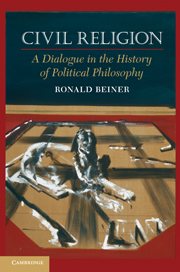Book contents
- Frontmatter
- Contents
- Preface and Acknowledgments
- Introduction
- Part I Machiavelli, Hobbes, Rousseau
- 1 Rousseau's Problem
- 2 The Machiavellian Solution
- 3 Moses and Mohammed as Founder–Princes or Legislators
- 4 Refounding and “Filiacide”
- 5 The Hobbesian Solution
- 6 Behemoth
- 7 Geneva Manuscript
- 8 Social Contract
- Part II Responses to (and Partial Incorporations of) Civil Religion within the Liberal Tradition
- Part III Theocratic Responses to Liberalism
- Part IV Postmodern “Theism”
- Conclusion
- Index
- References
6 - Behemoth
Hobbesian “Theocracy” versus the Real Thing1
Published online by Cambridge University Press: 05 June 2012
- Frontmatter
- Contents
- Preface and Acknowledgments
- Introduction
- Part I Machiavelli, Hobbes, Rousseau
- 1 Rousseau's Problem
- 2 The Machiavellian Solution
- 3 Moses and Mohammed as Founder–Princes or Legislators
- 4 Refounding and “Filiacide”
- 5 The Hobbesian Solution
- 6 Behemoth
- 7 Geneva Manuscript
- 8 Social Contract
- Part II Responses to (and Partial Incorporations of) Civil Religion within the Liberal Tradition
- Part III Theocratic Responses to Liberalism
- Part IV Postmodern “Theism”
- Conclusion
- Index
- References
Summary
Neither is any man so mad, as not to choose to yield obedience rather to them who can remit and retain their sins, than to the powerfulest kings.
– Thomas Hobbes[Religion] may speak about the bliss of the next world, but it wants power in this one.
– Christopher HitchensThere is an extensive analysis of policy toward religion in Behemoth, and therefore we should not omit this important work from our discussion of Hobbesian civil religion. What Hobbes was fundamentally concerned with in this book was theocracy in the proper (i.e., non-Hobbesian) sense as a historical regime. Civil religion is acceptable and even desirable from a Hobbesian point of view because it is a mode of theocracy ruled by the sovereign and subordinated to political–nonreligious concerns for civic order. Puritan theocracy – that is, real theocracy – is not acceptable because it is a subordination of political concerns to religious imperatives. As we saw in the previous discussion, Hobbes offers his own version of a theocratic politics to preclude a usurpation of political authority on the part of authentically religious claimants. As Stephen Holmes nicely puts the point, Hobbes “rhetorically divinizes the state” in the hope of diverting “religious piety away from Puritan sects, Presbyterian ministers, Anglican bishops, and, of course, the Pope.” But genuine theocracy, as witnessed in the English Civil War, thus runs directly contrary to the Hobbesian version of theocracy. For that reason, a ferocious root-and-branch anticlericalism occupies the very center of Hobbes's vision of politics, accounting for what Holmes calls Hobbes's “obsession with religion.”
Strangely, Hobbes begins with a critique of Papism – strange because this was surely peripheral to the problems of Charles I (it was anti-Papists, not Papists, who were challenging Charles's authority). This allows Hobbes to pose very sharply and very directly what we already know to be the central preoccupation of his civil-religion theorizing (viz., the threat of divided sovereignty):
This [Papist] power of absolving subjects of their obedience…is as absolute a sovereignty as is possible to be; and consequently there must be two kingdoms in one and the same nation, and no man be able to know which of his masters he must obey.
Papism impugns the temporal authority of all earthly sovereigns (Hobbes's phrase is, “by pretence of his power spiritual, [the Pope encroaches] upon the temporal rights of all other princes of the west”) by means of the argument that because Christ is “King of all the world,” and the Pope is Christ's vicar, therefore “what Christ could give, his vicar might give,” that is, political title to worldly domains. Hobbes implies quite clearly that Christian kings fail to recognize what fatal injury they do to their own sovereignty when they include the words “by the gift of God” (i.e., by the gift of the priests) in their titles, and when they allow bishops to confer upon them their crown and scepter. Papal innovations extending beyond Scripture are presented by Hobbes as a set of conspiracies intended to weaken kingly authority: The celibacy of priests had the effect of barring kings (who are necessarily concerned with the possibility of heirs) from the aura of the priesthood; the practice of confession instituted a network of “spies” listening in on the secret thoughts of the subjects of the state (and increased still further the priest's privileged aura); and the dispatching of a mobile unit of “preaching friars” was an additional device for the propagation of sermons that would inevitably play up ecclesiastical authority and diminish the authority of the civil power. Even the founding of universities, on Hobbes's view, was originally just another papal conspiracy designed to ensure that the ideology of the Church remained firmly in control. These are presented as radical criticisms of Catholic Christianity in particular. But the fact that Hobbes, in the context of this critique of Catholicism, switches in one key sentence (a sentence so daring that Hobbes felt compelled to erase it from the original manuscript of Behemoth!) from “his [the Pope's] bishops” to “bishops” in a generic sense, gives a fairly clear indication that Hobbes intended his attack on Papism as a bridgehead for a more general assault upon clericalism per se.
- Type
- Chapter
- Information
- Civil ReligionA Dialogue in the History of Political Philosophy, pp. 61 - 72Publisher: Cambridge University PressPrint publication year: 2010



